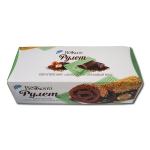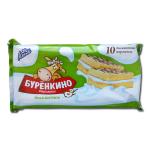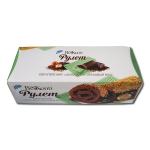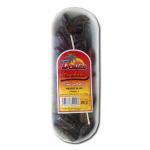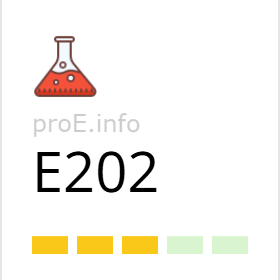
Other names for the additive (synonyms)
General Information
Potassium sorbate is the potassium salt of sorbic acid. In the food industry, it is labeled as additive E202 and used as a preservative.
Potassium sorbate does not occur naturally in its ready-to-use form. It is a synthetic substance obtained by neutralizing sorbic acid with potassium hydroxide.
At the same time, sorbic acid, which is the source material for producing potassium sorbate, is found in small quantities in some fruits. It was first extracted from rowanberry juice in 1859. The antimicrobial properties of sorbic acid were discovered in 1939. By the mid-1950s, industrial production of sorbic acid and its salts by synthetic means began for use as preservatives.
On an industrial scale, additive Е202 is produced from sorbic acid and potassium hydroxide. The process is as follows:
C₆H₈O₂ + KOH → C₆H₇KO₂ + H₂O
Chemical formula of potassium sorbate: C6H7KO2.
Key properties of preservative Е202:
- Taste – none.
- Color – white.
- Consistency – granules or powder.
Additive Е202 is the most soluble among the sorbates. Its solubility at room temperature is 138 grams per liter of water.
Effects on the Body
Risks of additive Е202
Several studies have shown that in large doses, potassium sorbate may damage cells, DNA, and cause mutations. It also induces oxidative stress, where an excess of reactive molecules harms cellular structures.
Such effects were observed in vitro and in animal cells, but they have not been proven to pose a risk to humans at normal food consumption levels.
In individuals with increased sensitivity to certain substances, potassium sorbate may cause skin and mucous membrane irritation. However, when consumed in typical amounts through food, its allergenic potential is minimal.
In 2015, the EFSA Panel on Food Additives and Nutrient Sources added to Food (ANS Panel) conducted a re-evaluation of additive Е202 and, based on available studies, reduced the acceptable daily intake to 3 mg per kg of body weight per day.
Benefits of additive Е202
Sorbic acid and its salt, potassium sorbate in particular, are among the most widely used preservatives due to their safety when consumed within established limits. However, there is no scientific evidence of any health benefits from regular consumption.
Potassium sorbate effectively inhibits the growth of mold, yeast, and some bacteria in food and cosmetics, which can potentially protect consumers from serious illnesses.
The maximum allowable concentration of preservative Е202 in finished products is set separately for each food category and typically ranges from 0.02% to 0.2%. Exact dosages are specified in regulatory documents.
Uses
Additive Е202 is used in the food industry as a preservative:
- Its primary use is in the production of cheese and sausage products, where potassium sorbate can inhibit mold growth.
- In the bakery industry, additive Е202 may be added to dough in rye bread production to prevent chalky mold formation.
- In the production of chocolate and confectionery – as a neutral-tasting preservative.
- In vegetable and juice canning.
- In the preparation of spicy and acidic Asian sauces – potassium sorbate is an effective antimicrobial agent in high-acidity environments, preventing yeast and mold formation.
Additive Е202 is most commonly found in the following products: margarine, mayonnaise, sausages, smoked meats, jams, juices, soft drinks, wine, sugary and flour-based confections.
Beyond the food industry, additive Е202 is also used as a preservative in cosmetics.
Additionally, potassium sorbate is included in certain pharmaceutical products to combat fungal infections.
Legal Status
Additive Е202 is approved for use in many countries, including Ukraine, EU countries, and others.
In the United States, potassium sorbate is classified as GRAS (Generally Recognized As Safe) for use in food.
